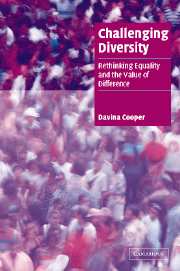Book contents
- Frontmatter
- Contents
- Acknowledgments
- 1 Introduction: mapping the terrain
- 2 Diversity politics: beyond a pluralism without limits
- 3 From blokes to smokes: theorising the difference
- 4 Towards equality of power
- 5 Normative encounters: the politics of same-sex spousal equality
- 6 Getting in the way: the social power of nuisance
- 7 Oppositional routines: the problem of embedding change
- 8 Safeguarding community pathways: ‘possibly the happiest school in the world’ and other porous places
- 9 Diversity through equality
- Bibliography
- Index
- Cambridge Cultural Social Studies
3 - From blokes to smokes: theorising the difference
Published online by Cambridge University Press: 22 September 2009
- Frontmatter
- Contents
- Acknowledgments
- 1 Introduction: mapping the terrain
- 2 Diversity politics: beyond a pluralism without limits
- 3 From blokes to smokes: theorising the difference
- 4 Towards equality of power
- 5 Normative encounters: the politics of same-sex spousal equality
- 6 Getting in the way: the social power of nuisance
- 7 Oppositional routines: the problem of embedding change
- 8 Safeguarding community pathways: ‘possibly the happiest school in the world’ and other porous places
- 9 Diversity through equality
- Bibliography
- Index
- Cambridge Cultural Social Studies
Summary
Which identity claims are rooted in the defense of social relations of inequality and domination? And which are rooted in a challenge to such relations? … Which differences … should a democratic society seek to foster, and which, on the contrary, should it aim to abolish?
(Fraser 1997: 184)The space of diversity politics, grounded in a recognition of multiple forms of social difference, vitalised by its concern for multiple forms of inequality, reverses the monolithic tendencies found within Marxism and radical feminism. Yet, in its enthusiasm to challenge disadvantage and to celebrate variety, diversity politics comes unstuck when it is confronted with less attractive ways of living and being. As I discussed in chapter 2, radical democrats and radical pluralists, such as Chantal Mouffe and Jeffrey Weeks, do not deny the need to draw limits in the differences worth supporting; however, their work gives little detailed or practical guidance on how these limits can be drawn. Practices such as oppression, subordination and limiting diversity sound like solid bases for identifying constituencies not worthy of support, yet even these terms can be ‘subverted’ in a pluralist model of power and discursively deployed against opponents by groups such as hunters, religious minorities and smokers.
My argument in this chapter is that we need a more detailed and theorised approach to thinking about different social constituencies.
- Type
- Chapter
- Information
- Challenging DiversityRethinking Equality and the Value of Difference, pp. 40 - 67Publisher: Cambridge University PressPrint publication year: 2004

